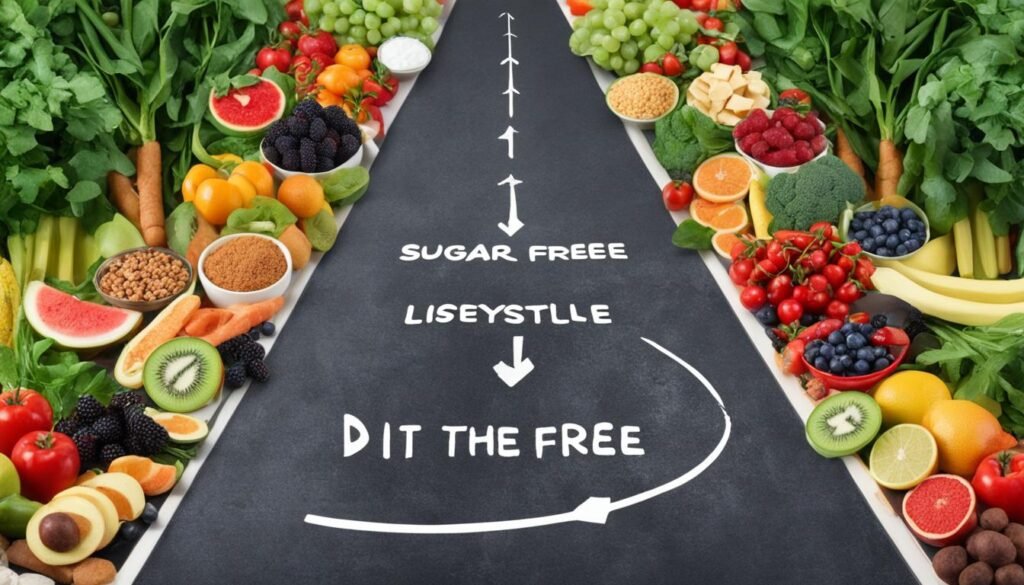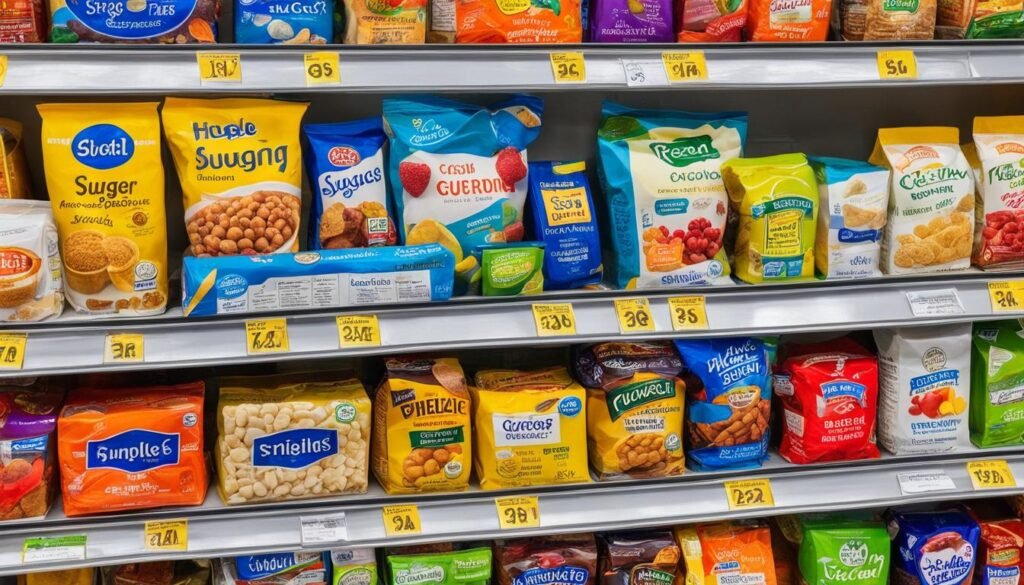Cutting down on sugar is essential for maintaining a heart-healthy lifestyle, especially for those with diabetes or prediabetes. Added sugars in desserts, drinks, and candy can lead to weight gain and spikes in blood glucose levels. Luckily, reducing sugar intake can be easier than expected (see my post here). By eliminating table sugar, sweeteners, and syrups, and cutting back on added sugar in foods, I can slowly reduce my sugar consumption.
Swapping soda for water or diet drinks and incorporating fresh or canned fruits without added syrup into my diet can also help manage my sugar intake. Comparing food labels and choosing products with the lowest amounts of added sugar is crucial. Additionally, adding fruit or using extracts instead of sugar in recipes and substituting sugar with unsweetened applesauce can significantly reduce my sugar consumption. I should also be mindful of my intake of non-nutritive sweeteners, as they may lead to increased sugar cravings. By making these simple changes, I can successfully reduce my sugar intake and embrace a low sugar lifestyle.
Key Takeaways:
- Reducing sugar intake is important for maintaining a heart-healthy lifestyle.
- Eliminate table sugar, sweeteners, and syrups to gradually reduce sugar consumption.
- Swap soda for water or diet drinks and incorporate fresh or canned fruits without added syrup.
- Compare food labels and choose products with the lowest amounts of added sugar.
- Add fruit or use extracts instead of sugar in recipes and substitute sugar with unsweetened applesauce.
The Impact of Excess Sugar on Health
Excess sugar consumption can have a detrimental impact on overall health. Studies have shown that high sugar intake is associated with weight gain, obesity, and an increased risk of developing diseases such as diabetes, metabolic syndrome, and cardiovascular diseases.
Sugar-sweetened beverages, including soft drinks and fruit drinks, contribute significantly to excess sugar consumption and have been linked to weight gain and an increased risk of obesity-related health issues. Consuming large amounts of sugar can also lead to metabolic disorders and an increased risk of developing type 2 diabetes.
It is important to be aware of the health risks associated with excess sugar consumption and to take steps to reduce sugar intake for better overall health (check this post out).
“Excessive sugar consumption is a major health concern, leading to weight gain, obesity, and various diseases. It is essential to understand the impact of sugar on our health and take proactive measures to reduce sugar intake.”
“The high consumption of sugar-sweetened beverages is a significant contributor to excessive sugar intake and its associated health risks. It is crucial to limit the consumption of sugary drinks and opt for healthier alternatives.”
The Link Between Sugar and Weight Gain
Excessive sugar consumption can contribute to weight gain and obesity. When consumed in large quantities, sugar adds empty calories to the diet, leading to an energy imbalance that promotes weight gain. Additionally, sugary foods and beverages can lack nutritional value, leading to increased hunger and overeating.
“Excessive sugar consumption can lead to weight gain due to the empty calories it provides. By reducing sugar intake, individuals can manage their weight more effectively.”
| Health Risks | Effects |
|---|---|
| Weight Gain and Obesity | Excess sugar consumption can lead to weight gain and increase the risk of obesity. |
| Type 2 Diabetes | High sugar intake can contribute to the development of insulin resistance and increase the risk of type 2 diabetes. |
| Cardiovascular Diseases | Excessive sugar consumption is associated with an increased risk of cardiovascular diseases, such as heart disease. |
Reducing Sugar Consumption for Better Health
It is important to take steps to reduce sugar consumption and improve overall health. By making small changes to the diet, such as limiting the intake of sugary foods and beverages, individuals can reduce their sugar intake and minimize the associated health risks.
“Reducing sugar consumption is crucial for maintaining good health. By choosing healthier alternatives and being mindful of our sugar intake, we can take control of our well-being.”
- Avoid sugar-sweetened beverages and opt for water, unsweetened tea, or infused water for a healthier choice.
- Read food labels and choose products with lower sugar content.
- Replace sugary snacks with fruits or nuts for a healthier alternative.
By taking these proactive measures, individuals can reduce their sugar consumption and embrace a healthier lifestyle.
The Importance of Sugar Reduction for Weight Management

Sugar reduction plays a crucial role in weight management. Consuming excessive amounts of sugar can lead to weight gain and make it challenging to achieve weight loss goals. Sugar has addictive properties that can contribute to cravings and overeating. By reducing sugar intake, individuals can curb cravings and manage weight more effectively.
One of the key strategies for weight management is adopting healthy eating patterns that prioritize whole foods, fruits, vegetables, lean proteins, and whole grains. These nutrient-dense foods not only provide essential vitamins and minerals but also help reduce sugar consumption while promoting weight loss. By incorporating these healthier options into the diet, individuals can create sustainable and enjoyable eating habits.
In addition to choosing healthier options, portion control plays a significant role in weight management. Controlling portion sizes can help individuals manage their daily calorie intake and reduce the consumption of sugary foods and beverages. By being mindful of portion sizes and eating smaller, balanced meals, individuals can better manage their weight and reduce their sugar intake.
For those looking to satisfy their sweet tooth without the added calories, low-calorie sweeteners can be used as alternatives to sugar. These sweeteners provide the sweet taste without the additional carbohydrates and calories. However, it’s important to consume low-calorie sweeteners in moderation and as part of a balanced diet.
To illustrate the importance of sugar reduction for weight management, here’s a table comparing the calorie content of sugar and low-calorie sweeteners:
| Sugar | Calories per teaspoon |
|---|---|
| Regular Sugar | 16 |
| Honey | 21 |
| Maple Syrup | 52 |
| Low-Calorie Sweeteners | Calories per teaspoon |
| Stevia | 0 |
| Xylitol | 10 |
| Erythritol | 0 |
By incorporating sugar reduction strategies into a balanced diet and practicing portion control, individuals can support their weight loss efforts and overall health (see my post here).
The Link Between Added Sugars and Chronic Diseases
There is a growing body of evidence linking added sugar consumption to the development of chronic diseases. Excessive sugar intake has been associated with an increased risk of developing heart disease, certain types of cancer, nonalcoholic fatty liver disease, and chronic inflammation. Consuming large amounts of added sugars can lead to weight gain and obesity, which are risk factors for various chronic diseases. Additionally, high sugar intake can have negative effects on liver health and contribute to insulin resistance. Chronic inflammation, which is linked to many diseases, can be triggered by a diet high in sugar. Moreover, excessive sugar consumption has been associated with cognitive decline and an increased risk of neurological disorders. By reducing sugar intake, individuals can reduce their risk of developing chronic diseases and prioritize their long-term health.
To understand the impact of added sugars on chronic diseases, let’s take a closer look at some specific conditions:
Sugar and Heart Disease
High sugar consumption has been found to increase the risk of heart disease. Excess sugar in the diet contributes to weight gain, obesity, and the development of metabolic disorders such as high blood pressure and dyslipidemia. These conditions can significantly increase the likelihood of heart disease, including heart attacks and strokes.
Sugar and Cancer
While the direct link between sugar and cancer is still being explored, studies suggest that a high-sugar diet may increase the risk of certain types of cancer. Excessive sugar consumption can contribute to obesity, inflammation, insulin resistance, and oxidative stress – all factors that are associated with the development and progression of cancer.
Sugar and Liver Health
Consuming too much sugar, especially in the form of fructose, can have detrimental effects on liver health. Excessive sugar intake overwhelms the liver’s capacity to metabolize and store it as glycogen, leading to the accumulation of fat and the development of nonalcoholic fatty liver disease (NAFLD). NAFLD is a condition that ranges from simple fatty liver to more severe forms like liver fibrosis and cirrhosis.
Sugar and Inflammation
A diet high in sugar can trigger chronic inflammation in the body. When we consume excessive amounts of added sugars, the body releases pro-inflammatory molecules, leading to a state of chronic low-grade inflammation. This chronic inflammation is linked to the development of various chronic diseases, including cardiovascular diseases, diabetes, cancer, and neurodegenerative disorders.
Sugar and Brain Health
Excessive sugar intake has been associated with cognitive decline and an increased risk of neurological disorders. Studies have shown that high sugar consumption can impair cognitive function and negatively affect memory and learning abilities. The mechanisms behind this link involve the detrimental effects of sugar on insulin sensitivity, inflammation, and oxidative stress in the brain.
By recognizing the role of added sugars in chronic diseases, individuals can take proactive steps to reduce their sugar intake and improve their overall health and well-being.
| Chronic Disease | Link to Excessive Sugar Consumption |
|---|---|
| Heart Disease | High sugar intake contributes to weight gain, obesity, and metabolic disorders that increase the risk of heart disease. |
| Cancer | A high-sugar diet may promote conditions like obesity, inflammation, and insulin resistance, which are linked to cancer development. |
| Liver Health | Excessive sugar consumption can lead to nonalcoholic fatty liver disease and impair liver function. |
| Inflammation | A high-sugar diet triggers chronic low-grade inflammation, which is associated with various chronic diseases. |
| Brain Health | High sugar intake has been linked to cognitive decline and an increased risk of neurological disorders. |
Understanding the link between added sugars and chronic diseases emphasizes the importance of reducing sugar intake and adopting a balanced, nutritious diet for long-term health and disease prevention.
Recognizing Hidden Sugars in Processed Foods

Hidden sugars in processed foods can contribute significantly to excess sugar consumption. Many processed foods, such as sauces, dressings, bread, and packaged snacks, contain added sugars that may not be immediately apparent.
Reading food labels is essential for identifying added sugars and making more informed choices. Recognizing ingredients that indicate the presence of added sugars, such as brown sugar, corn syrup, dextrose, fructose, glucose, high-fructose corn syrup, honey, maltose, molasses, and sucrose, can help individuals reduce their overall sugar intake.
| Processed Food | Hidden Sugars |
|---|---|
| Sauces | Ketchup, barbeque sauce |
| Dressings | Thousand Island, ranch |
| Bread | Certain types of white bread |
| Packaged Snacks | Granola bars, flavored yogurt |
By being vigilant about hidden sugars and choosing products with lower added sugar content, individuals can make healthier food choices and reduce their sugar intake.
Healthy Sugar Alternatives for a Low Sugar Diet

When it comes to reducing sugar intake, there are numerous healthy alternatives and substitutes available. These options provide a sweet taste without adding extra calories or causing spikes in blood sugar levels. Let’s explore some of the natural sweeteners and spices that can be incorporated into a low sugar diet:
- Stevia: Derived from the leaves of the stevia plant, stevia is a popular sugar substitute that can be up to 200 times sweeter than regular sugar. It has low to zero calories and is a suitable option for individuals with diabetes or those following a low-calorie diet.
- Xylitol: Xylitol is a sugar alcohol that occurs naturally in fruits and vegetables. It has a similar sweetness to sugar but with fewer calories. Xylitol can be used in baking and as a sweetener for beverages, providing a sugar-like taste without contributing to tooth decay.
- Erythritol: Another sugar alcohol, erythritol is derived from fruits and fermented foods. With zero calories and a low glycemic index, it is an excellent option for those looking to reduce their sugar intake. Erythritol is heat-stable and can be used in various recipes as a sugar replacement.
- Monk Fruit Extract: Derived from the monk fruit, this natural sweetener is intensely sweet without adding any calories or carbohydrates. It can be used in baking, cooking, and beverages as a sugar substitute. Monk fruit extract is also suitable for individuals following a ketogenic diet or those concerned about their blood sugar levels.
Aside from these sugar substitutes, spices can also add flavor to dishes without the need for additional sugar. Spices like cinnamon, nutmeg, allspice, and ginger can enhance the taste of foods, making them more enjoyable without the negative effects of sugar. These spices can be incorporated into various recipes, such as oatmeal, smoothies, and baked goods, to provide a satisfying taste profile.
By replacing sugar with these healthy alternatives and incorporating spices into meals and beverages, individuals can successfully reduce their sugar intake while still enjoying the flavors they love.
Comparison of Healthy Sugar Alternatives
| Sugar Alternative | Sweetness Level | Calories per teaspoon | Glycemic Index |
|---|---|---|---|
| Stevia | 200-400 times sweeter than sugar | 0 | 0 |
| Xylitol | Equal sweetness to sugar | 10 | 13 |
| Erythritol | Approximately 70% as sweet as sugar | 0.2 | 0 |
| Monk Fruit Extract | 150-200 times sweeter than sugar | 0 | 0 |
Strategies for Managing Sugar Cravings

Sugar cravings can be a challenge when trying to reduce sugar intake. However, there are strategies that can help manage these cravings.
- Avoiding trigger foods: Identifying the foods that trigger your sugar cravings can help you stay on track. Remove or limit these foods from your pantry to reduce temptation.
- Practicing mindful eating: Paying attention to your body’s hunger and fullness cues can prevent overeating and help you make healthier choices. Take the time to savor each bite and enjoy the flavors of your food.
- Incorporating healthy snacks: Opt for nutritious snacks that can satisfy your sweet tooth without the added sugar. Some healthy snack options include fresh fruits, Greek yogurt, nuts, and seeds.
- Engaging in distracting activities: When a sugar craving strikes, distract yourself with activities that can shift your attention away from food. Go for a walk, read a book, or engage in a hobby that keeps your mind occupied.
- Staying hydrated: Sometimes, thirst can masquerade as hunger or sugar cravings. Stay hydrated by drinking plenty of water throughout the day to help reduce cravings.
- Seeking support: It can be challenging to manage sugar cravings on your own. Reach out to friends, family, or a healthcare professional for support and guidance. They can provide accountability and help you stay motivated.
By implementing these strategies, you can better manage your sugar cravings and successfully reduce your sugar intake.
| Strategy | Benefits |
|---|---|
| Avoiding trigger foods | Minimizes temptation and reduces the likelihood of giving in to sugar cravings. |
| Practicing mindful eating | Helps you make conscious food choices and prevents overeating. |
| Incorporating healthy snacks | Satisfies cravings with nutritious alternatives and supports overall health. |
| Engaging in distracting activities | Shifts focus away from cravings and helps break the cycle of mindless snacking. |
| Staying hydrated | Prevents dehydration and reduces the likelihood of mistaking thirst for sugar cravings. |
| Seeking support | Provides guidance, motivation, and accountability in managing sugar cravings. |
Incorporating Sugar Reduction Strategies into a Healthy Lifestyle

Sugar reduction strategies are most effective when incorporated into a healthy lifestyle. By making long-term changes to our eating habits, we can better control our sugar intake and prioritize our well-being.
One way to achieve this is through meal planning and cooking at home. By preparing our own meals, we have the power to choose ingredients and control the amount of sugar we consume. This allows us to make healthier choices and limit our exposure to added sugars found in processed foods.
Practicing mindful eating is another valuable strategy for reducing sugar consumption. By paying attention to our hunger and fullness cues, we can become more aware of our eating habits and develop a healthier relationship with food. Taking the time to savor each bite and truly enjoy the flavors can help satisfy cravings and reduce the desire for sugary foods.
Regular exercise is not only beneficial for overall health but also plays a role in sugar reduction. Engaging in physical activity helps regulate blood sugar levels, making it easier to manage sugar cravings. By incorporating exercise into our daily routine, we can support our body’s natural mechanisms for sugar metabolism.
Stress management is also crucial in our journey towards a low-sugar lifestyle. Stress can often trigger emotional eating and lead to a desire for sugary foods as a means of comfort. By practicing relaxation techniques, such as deep breathing, meditation, or engaging in hobbies, we can reduce stress levels and prevent emotional eating.
| Healthy Lifestyle Changes for Sugar Reduction |
|---|
| Meal planning and cooking at home |
| Mindful eating practices |
| Regular exercise |
| Stress management |
By incorporating these strategies into our daily lives, we can create a sustainable and healthy lifestyle that supports our sugar reduction goals. With dedication and perseverance, we can take control of our sugar consumption and enjoy the benefits of a low-sugar lifestyle.
The Benefits of a Low Sugar Lifestyle

Adopting a low sugar lifestyle can have numerous benefits for overall health and well-being.
- Improved energy levels: By reducing sugar intake, individuals experience minimized sugar crashes and fluctuations, resulting in sustained energy throughout the day (see my post here).
- Better weight management: A low sugar diet supports weight loss and helps individuals achieve and maintain a healthy weight by reducing calorie consumption and minimizing sugary food cravings.
- Reduced risk of chronic diseases: By reducing sugar consumption, individuals significantly lower their risk of developing chronic diseases such as diabetes, heart disease, and certain types of cancer.
- Improved heart health: A low sugar lifestyle reduces the risk of high blood pressure, inflammation, and insulin resistance, promoting better heart health.
- Enhanced cognitive function: By reducing sugar intake, individuals experience improved focus, mental clarity, and cognitive function (see my post here).
Embracing a low sugar lifestyle allows individuals to enjoy these benefits and enhance their overall quality of life, making it a worthwhile choice for long-term health and well-being.
| Benefits of a Low Sugar Lifestyle |
|---|
| Improved energy levels |
| Better weight management |
| Reduced risk of chronic diseases |
| Improved heart health |
| Enhanced cognitive function |
Conclusion
Incorporating smart sugar reduction strategies into my daily life has been essential for improving my health and well-being. By implementing these strategies, such as reducing my intake of sugary foods and drinks, choosing healthy sugar alternatives, managing my sugar cravings, and making lifestyle changes that prioritize a low sugar diet, I have successfully been able to cut back on my sugar consumption and embrace a low sugar lifestyle.
By following these sugar reduction strategies, I have experienced numerous benefits. My energy levels have improved, and I no longer experience the highs and lows of sugar crashes. I have also been able to manage my weight more effectively and work towards achieving my weight loss goals. Furthermore, I have reduced my risk of chronic diseases such as diabetes, heart disease, and certain types of cancer.
I have also noticed improvements in my heart health, with a reduction in my blood pressure and inflammation markers. Additionally, my cognitive function has enhanced, and I enjoy better focus and mental clarity. These benefits have motivated me to continue prioritizing a low sugar lifestyle and make healthier choices.
By incorporating these sugar reduction strategies into my daily routine, I have taken control of my sugar consumption and achieved long-term health goals. I encourage dieters and individuals looking to improve their health to embrace these strategies and enjoy the benefits of a low sugar lifestyle. With improved energy, better weight management, reduced risk of chronic diseases, improved heart health, and enhanced cognitive function, it is possible to lead a healthier life while still enjoying the foods we love.
Source Links
- https://www.heart.org/en/healthy-living/healthy-eating/eat-smart/sugar/tips-for-cutting-down-on-sugar
- https://www.ncbi.nlm.nih.gov/pmc/articles/PMC7839604/
- https://health.gov/sites/default/files/2019-10/DGA_Cut-Down-On-Added-Sugars.pdf




